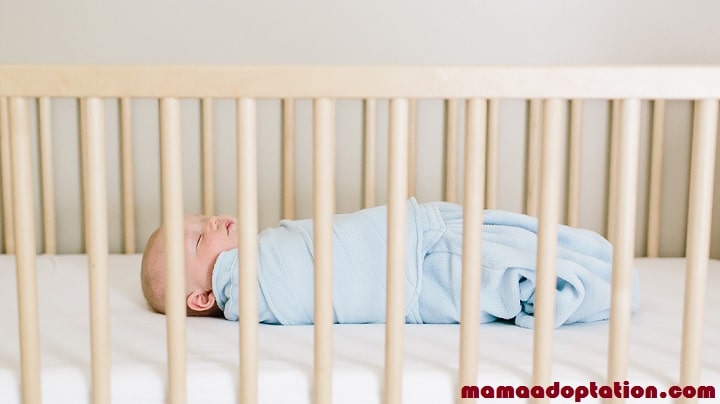Most parents assume that once their baby is born, they’ll need to spend some time in the hospital before being discharged. However, there is a growing trend of newborns being discharged straight to their crib, skipping the bassinet stage altogether.
One big reason for this change is that research has shown that infants who spend time in the bassinet are more prone to SIDS (sudden infant death syndrome). Bassinets also place a lot of stress on mothers and can lead to back pain in later life. Experts say that if your baby has been sleeping well through the night and you’re comfortable with them sleeping in your room, then keeping them in your bed may be better for both of you.
Can a newborn sleep in a crib?
Some parents swear by the benefits of co-sleeping with their newborn. Co-sleeping proponents believe that allowing babies to sleep in the same room as their parents allows for better bonding and sleeping habits. However, many think a newborn should sleep in a crib. A study published in “The Journal of Pediatrics” found that babies who slept in cribs were significantly less likely to develop otitis media (a middle ear infection) than those who slept in other beds.
While there are some disadvantages to co-sleeping, such as the increased risk of SIDS (sudden infant death syndrome), experts recommend that parents consult with their pediatrician before making any decisions about sleep arrangements for their newborn.
How soon is to put the baby in the crib?
When putting your newborn in their crib, the earlier, the better. “Butterfly” babies, who are born prematurely and weigh only 1 or 2 pounds, should not be put in a crib until they are at least 12 to 16 weeks old. “Web-footed” babies, born between 16 and 24 weeks gestation, should still not be placed in a crib until they can stand up and hold their heads up unsupported.
Can you leave a newborn alone in the crib?
When it comes to newborns, many parents feel that they can’t leave them alone in the crib anytime. However, research shows that babies do just fine when left in their own space for short periods. Babies who are left alone in their cribs for short periods have better mental and physical health than those who are not alone.
Some experts believe infants need a certain amount of solitude to develop correctly. Left to their own devices, newborns will explore their surroundings and learn how to interact with others. This is important because it helps them learn to trust others and build relationships later in life.
If you decide you want to leave your baby alone in the crib, be sure to set specific rules for them. Choosing a bassinet or straight-to-the-crib for your newborn is an important decision. Bassinets provide a safe, cozy place for your baby to sleep while you are away. Cribs are more traditional and can accommodate a toddler as well. Each has its benefits and drawbacks:
Bassinets:
-Are safer than cribs because they don’t have sharp edges or corners.
-Are more comfortable for the baby because they are soft and have plenty of padding.
-Can be used in the family room or nursery.
-Can be converted to a full crib later if needed.
-May require assembly.
Cribs:
-Are typically larger than bassinets, making them better for older babies or toddlers who will outgrow the bassinet quickly
Pros and Cons of Starting Newborn in a Crib
Pros:
-Newborns sleep near their parents, which benefits both the child and the parents.
-It’s easier to keep track of newborns if they are in a crib than in a separate room.
-A crib is typically cheaper than purchasing separate items for a nursery.
Cons:
-A newborn can become overwhelmed and uncomfortable if not kept in a safe environment. A crib can be dangerous if it’s not sturdy enough or if the child falls out of it.
-If you choose to place your newborn in a crib, you’ll need to ensure that it’s big enough for them to sleep comfortably.
How do you get a newborn to sleep in a crib?
You can do a few things to help your newborn sleep in a crib. First and foremost, make sure the crib is comfortable for them. Consider using a firm mattress or buying a crib with features like a rocker or sleeper. If your baby wakes up often, try using white noise or calming music to help them fall asleep. You can also try breastfeeding in the crib if you’re able and see if that helps your baby sleep through the night.
The newborn won’t sleep in the crib – only in my arms.
You can do a few things to help your newborn sleep in a crib. First and foremost, make sure the crib is comfortable for them. Consider using a firm mattress or buying a crib with features like a rocker or sleeper. If your baby wakes up often, try using white noise or calming music to help them fall asleep. If you’re able, you can also try breastfeeding in the crib to see if it helps your baby sleep through the night.
Conclusion
You can do a few things to help your newborn sleep in a crib. First and foremost, make sure the crib is comfortable for them. Consider using a firm mattress or buying a crib with features like a rocker or sleeper. If your baby wakes up often, try using white noise or calming music to help them fall asleep. You can also try breastfeeding in the crib to see if it helps your baby sleep through the night.
Read more…
Baby Boy Is Peeing Up Out of His Diaper (Causes and their solutions)








